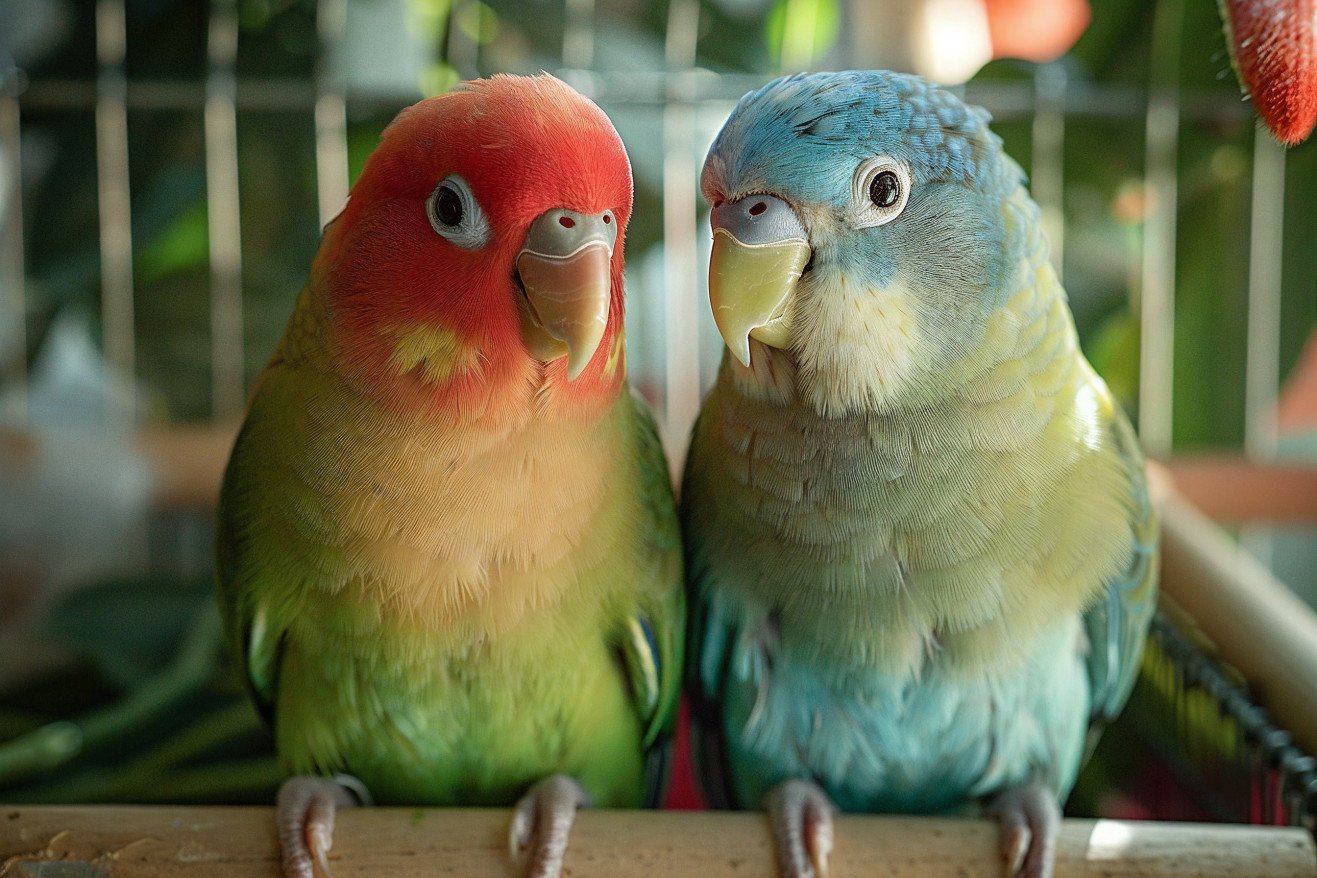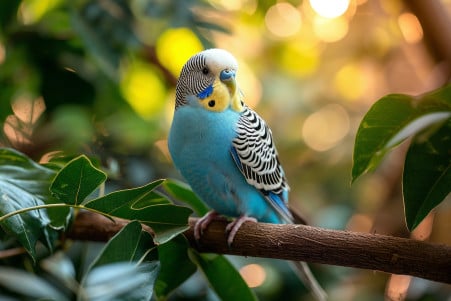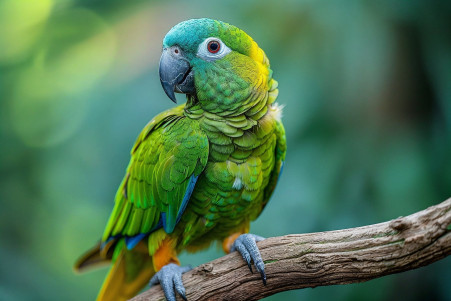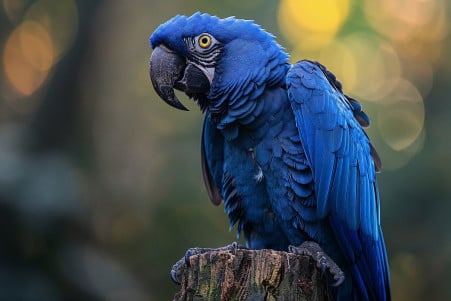How Long Do Lovebirds Live? Lifespan and Care Tips
11 May 2024 • Updated 10 May 2024

Lovebirds are wonderful pets, but if you decide to bring one into your home, how long can you expect to enjoy their colorful company? In general, lovebirds can live to be 10-15 years old in captivity if they are cared for properly. That said, the average lifespan of a lovebird is closer to 8-10 years. This is significantly longer than the average lifespan of a wild lovebird, which is only 3-5 years due to the threat of predators and other factors in their natural habitat.
Although lovebirds are considered small parrots, their lifespan is about average when compared to other types of parrots. In order to ensure that your lovebird lives as long as possible, we've outlined evidence-based recommendations for diet, housing, and care below. This includes important information on nutrition, exercise, veterinary needs, and environmental enrichment that will affect how long and how well lovebirds live in captivity.
How long do lovebirds live?
Nutrition: The Most Important Factor for a Long Life
A lovebird's diet is the most important factor in determining how long they will live. In order to live up to their potential lifespan of 10-15 years, lovebirds need a diet that meets their nutritional needs. According to the MSPCA-Angell, this means a diet that includes a small parrot seed mix, fresh vegetables, greens, fruits, nuts, and sources of calcium like cuttlebone. If lovebirds are fed a diet that doesn't meet their nutritional needs, they can suffer from a range of health problems including obesity, malnutrition, and vitamin deficiencies, all of which can shorten their lifespan.
Lafeber Co. notes that a balanced diet is the most important factor in determining how long pet birds will live. If a bird's diet is too high in fat, they don't get enough vitamins and minerals, or they don't get enough protein and calcium, they can suffer from a range of health problems. To help birds live longer, Lafeber Co. recommends feeding them a diet that includes berries, leafy greens, whole grains, and calcium-rich seeds and nuts. However, there are also some human foods that are toxic to birds, including avocado, chocolate, and caffeine.
In order to make sure that your lovebird's diet is meeting all of their nutritional needs, it's best to consult an avian veterinarian. Avian vets can provide species-specific advice on everything from the best seed mixes to feed your bird to the best fresh foods to offer them to whether they need any supplements and how much of each food group they should be eating.
With the right diet, lovebirds can live long, healthy lives that allow for many years of companionship. However, there are other factors that also play a role in determining how long lovebirds live, including housing and environmental conditions, which we'll discuss next.
Housing and Environment: Making a Safe Space
In order to be happy and healthy, lovebirds need a large and secure cage or aviary. The MSPCA-Angell explains that the cage should be large enough to accommodate their high activity level and provide plenty of room for exercise and play. Proper temperature and humidity, along with good ventilation, are also important for lovebirds.
It's also important to maintain a clean and safe living space that's free from potential toxins and other dangers. As the Bird's Lover points out, environmental factors like a safe and stimulating living space can have a big impact on a lovebird's lifespan. Enrichment items like toys, perches, and foraging opportunities can help keep lovebirds from getting bored and encourage natural behaviors.
Ensuring that your lovebird has a safe, clean, and stimulating environment will help ensure that they're healthy and may even help them live longer. The next important factor in keeping a lovebird healthy in the long run is proper veterinary care.
Veterinary Care: Keeping Lovebirds Healthy
Regular vet visits and preventive care are important for catching and treating potential health concerns in lovebirds. According to the Merck Veterinary Manual, lovebirds can suffer from a number of illnesses and conditions, including respiratory infections, feather disorders, and reproductive problems. Early detection and treatment by an avian vet, as outlined by VCA Animal Hospitals, can help control these issues and lengthen a lovebird's life.
Vaccinations, parasite control, and regular check-ups are also important preventive care measures, according to the Bird & Exotics Veterinarian. It's important to find an experienced avian vet to ensure a lovebird receives the best care possible throughout its life. With the right vet care and preventive health care, lovebird owners can help make sure their pets live long, happy lives.
Social Interaction and Mental Stimulation
Lovebirds are highly social and intelligent birds that need regular mental stimulation and social interaction to stay healthy. As mentioned by Lafeber Co., offering social interaction, whether it be from another lovebird or from humans, is important for their mental health. Mental stimulation can be provided through toys, puzzles, and foraging opportunities to keep them from getting bored and to encourage natural behaviors.
As noted by PetHelpful, a lack of social interaction and mental stimulation can lead to behavioral issues and potential health problems, which can shorten their life span. Playing with them and training them and providing environmental enrichment, as suggested by Pet Care Parents, can ensure that lovebirds are mentally and physically stimulated. By making sure that they are socially and mentally fulfilled, owners can ensure that their lovebirds are healthy and living their longest lives.
How to Breed and Raise Lovebird Babies
Lovebirds are known for their prolific breeding, and they can have multiple clutches of eggs in a single year in captivity. However, as Parrot Parrot explains, the right breeding environment and nesting materials are important for successful breeding and the health of the babies. According to Spruce Pets, nest boxes that are approximately 12 inches on all sides with a 3-inch hole for an entrance and filled with nesting material like shredded paper are ideal.
As Parrot Parrot notes, DNA sexing can be used to determine the sex of lovebirds to ensure that they are paired with the right mate. Although lovebirds aren't sexually dimorphic, there are some physical signs that can help you determine the sex of your birds, like a wider stance and larger pelvic bones, that are more common in females.
As PetHelpful explains, hand-raising lovebird babies is time-consuming and labor-intensive, but it can result in a very friendly and social pet. According to Spruce Pets, it's important to make sure that the chicks are getting the right nutrition, warmth, and care in the first few weeks of their lives to ensure that they grow up healthy and strong.
Conclusion: How to Help Lovebirds Live Long, Healthy Lives
Lovebirds are known for the loving, attentive bond they tend to form with their mates, as noted by Lafeber Co.. This strong pair bond is a key part of their social and emotional needs. Providing a companion lovebird or frequent human interaction is essential for their wellbeing.
Hand-rearing lovebird chicks can be a very rewarding experience, but it's also very demanding. As explained in a PetHelpful article, the process involves a lot of careful feeding and care. Making sure the chick gets the right nutrition, stays warm, and is handled gently is important for ensuring that it grows up healthy and lives a long life.
When it comes to weaning lovebird chicks, it's important to make sure that they're exposed to a variety of different foods, including seeds, fresh fruits, and other healthy options. By making sure that the chick is willing to try new foods and gets a balanced diet, you can help ensure that it grows up healthy and lives a long life.
Throughout their lives, lovebird owners need to be aware of their pet's personality and any potential behavioral problems. Because baby lovebirds can be aggressive, it's important to make sure that they're handled gently and carefully. With the right care, these intelligent birds can make affectionate, friendly pets.


